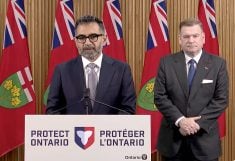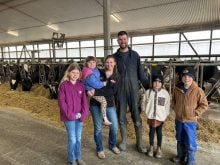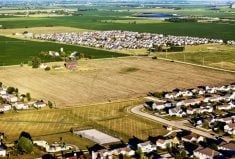Questions and answers have been edited for length.
Canada’s Minister of Agriculture and Agri-Food Marie-Claude Bibeau recently talked to Glacier FarmMedia Ottawa reporter D.C. Fraser in a year-end interview.
Looking back at the year, what was the biggest personal challenge of the COVID-19 pandemic for you?
Trying to identify those who were the most in need of support and trying to find the resources to help them, we had to look at the food supply chain. Then came everything related to where labour was a very, very challenging issue through the year, along with temporary foreign workers, but also finding ways to support the processors and the farmers, to make their working and living environment safe.
Read Also

New Iridium technology helps block GPS spoofing
A tiny new chip will allow Iridium’s Positioning, Navigation and Timing (PNT) signals to be received much smaller devices, create a backstop against Global Positioning Systems (GPS) spoofing.
If you could travel back in time to before the pandemic, what advice would you give yourself?
I think we are still too into it to have this discussion… we’ll have to do this analysis, but I think we’ve done a lot. We could always do better, of course, but I’m still proud of what we’ve done and how we’re able to support (farmers).
At the end of the year, it’s been extremely difficult for the farmers, a lot of anxiety, a lot of uncertainty, a lot of adaptation. But when we look at the numbers now, they had, most of them had, a good year. Overall, it’s been a good agricultural year.
We’re going to have a record in terms of exports, but I know that some sectors have been hit hard and are still in need of help. That’s why we’re working on improving the (business risk management) programs.
But overall, it’s one of the sectors of the economy that was able to get through the crisis.
You are Canada’s first female agricultural minister. What has that meant to you? How do you think it has helped?
When we want to look forward and you know, as a vision for the sector, it’s very important that we make sure that the decisions are being taken by those who will be there in 10 or 20 years. I think I’m making a difference and pressing on all the partners I work with to have more women and more young people around the decision-making table.
When I came into the office almost three years ago now, most of the stakeholders I was meeting with were men, and I would say experienced men. I’ve been pushing a lot, creating the youth council and encouraging women to step up.
I also have (Canadian Federation of Agriculture president) Mary Robinson, who is a good role model. But I really think that if we want to make the right decisions for the next generation, they have to be around the table. And we need more women around the table, to understand better what the issues are, as a different perspective on how we can move forward and acknowledge what the next generation wants.
Even if we want to do our best for them. That doesn’t mean that we see the future the same way they do.
I believe that we are talking a lot more about the environment. And it’s not only me, that this is a very important topic for, but also talking about mental health. The new generation are bringing this subject on the table more than others, and they are more open to talking about it. Food Security is also something that is of greater importance for the next generation. And everything regarding awareness, public awareness is very important for them.
I did not know I was a feminist before I entered into politics. This is something that I kind of took for granted, and then I realized, ‘oh my God, we definitely cannot take it for granted.’ If I was privileged, that’s one thing, but there are so many women who still need assistance and to have an opportunity to develop their full potential. I have a role to play.
Your background is in international development. How have you leveraged that experience to help in your current position?
Well, having to work on food security in Canada is heartbreaking. Because when you realize that we do have Canadians, who are food insecure in Canada, how could it be? We have to do better, we have to support them better. I’ve been directly involved in all the food aid programs that we have put in place during COVID. This is something I could relate to maybe from what I was doing before.
My experience with foreign countries is also something that is a bit similar in terms of international relationships.
What are some of the biggest challenges you see producers facing in 2021?
When we look at the growth of the sector and in terms of exports, it’s very encouraging. We want to keep supporting them, we want to strengthen their business risk management programs, we want to increase our programs for them to have access to new technologies.
There will be significant components of the (federal) climate plan that are related to agriculture. I’m very excited about that. That will really be at the heart of my work for the coming months and years, hopefully. Everything related to research and innovation and sharing best practices.
What message do you have who remain opposed to the federal government’s climate plan?
I’m confident that overall, when you put all the opportunities and challenges on the table, it will be positive support for the ag sector. Yes, the price on pollution is one thing, but you know all the money that comes from the price on pollution is distributed in the province, and a part of it is kept for projects in the agricultural sector.
We have reinvested almost $12 million in ag projects, actually 186 clean tech projects across Canada, and 16 of which are related to grain drying. We are using a part of these revenues to support farmers to be better equipped to pay less in terms of energy, and therefore the price on pollution. There will be challenges around the fertilizer, improving the way we use fertilizer to decrease emissions. There are opportunities, but we have to push ourselves forward.
I really feel that farmers will feel that they have been heard, and there will be much more opportunities for them through the new biofuels strategy.















